2020 年湖北武汉科技大学翻译英语考研真题及答案
Part I. Vocabulary and Grammar (20 points, 1 point for each) Directions: There are 20
statements in this section. After each statement there are four choices marked A, B, C, and D.
Select the only one choice that best completes the statement. Write your answers on your
answer sheet.
1. They didn’t find that the meeting was _____ until they got to the hall.
A. canceled
B. conceived
C. put out
D. cut down
2. There are many kinds of steel, each ______ its uses in industry.
A. has
B. had
C. have
D. having
3. They had food and clothing _______ for their needs.
A. sufficient
B. efficient
C. proper
D. considerable
4. The two brave young men ______ the day when their own country was liberated.
A. longed to
B. desired after
�
C. longed for
D. longed after
5. It _____ to rain cats and dogs that day.
A. happened
B. occurred
C. took place
D. was
6. That’s his first offence, and the judge is going to give him a light _____.
A. sentence
B. crime
C. service
D. claim
7. Were there any exciting _____ during your journey?
A. incidents
B. accidents
C. events
D. business
8. A month after 5-year-old Leanna Warner was reported missing, her family still ____ hope
even as they try to live a “new” normal life.
A. holds out
B. holds up
C. holds to
D. holds back
�
9. This information is only _____ data and will need further analysis.
A. net
B. gross
C. raw
D. rough
10. Is the _____ of food and clothes to the hungry more helpful than giving money?
A. donation
B. devotion
C. dedication
D. compensation
11. He was already _____ the ship.
A. board
B. aboard
C. abroad
D. broad
12. After graduation, he suddenly became interested in the _____ of literature and art.
A. realm
B. range
C. area
D. zone
13. Stormy applause broke forth _____ he appeared on the stage.
A. for the moment
�
B. the moment
C. at the moment when
D. the moment when
14. A good salesman must be _____ if he wants to succeed.
A. militant
B. offensive
C. aggressive
D. certain
15. Physics is _____ to the science which was called natural philosophy in history.
A. likely
B. uniform
C. alike
D. equivalent
16. So much _____ about his financial position that he can’t sleep at night.
A. he worries
B. does he worry
C. did he worry
D. he worried
17. Many are socially active, are involved as volunteers, and are _____ new responsibilities.
A. taking on
B. taking over
C. taking in
�
D. taking after
18. I will now introduce the candidate in support of _____ I wish to speak.
A. which
B. who
C. that
D. whom
19. At 125th Street, Mr. Torres would _____ to the No. 2 train by crossing the platform.
A. infer
B. transform
C. transfer
D. refer
20. Not that I don’t want to go, _____ that I have no time.
A. although
B. despite
C. but
D. for
Part II. Error Correction (10 points, 1 point for each)
Directions: This part consists of a short passage. In this passage, there are altogether 10
mistakes, one in each numbered line. You are required to change a word, add a word or delete a
word. If you add a word, put an insertion mark (Λ) in the right place and write the missing word
in the corresponding blank on your answer sheet. If you delete a word, cross it and put a slash (/)
in the corresponding blank on your answer sheet. If you change a word, cross it and put your
word in the corresponding blank on your answer sheet. Remember to write the correct number
beside each blank on the answer sheet.
For most parents, having a newborn in the house can
�
disrupt sleep schedules. Generally, there aren’t any long-term
health effects.
It’s a evolutionary thing that’s built in to help us raise 21. _______
newborns, though there are really no studies for this. New 22. _______
parents can prepare by understanding, and accepting, which 23. _______
the first few months will most likely consist of disrupted
sleep. If you followed the guidelines below, the disrupted 24. _______
sleep will likely last for only a few months, which is rather
short-term in the scheme of things. During the first six months of life,
babies sleep soundly in two-to-four hour periods. Newborns are not
born with a cycle that makes him stay awake during the day 25. ________
and sleep at night. Rather, sleep is spaced regularly to piece 26. _______
throughout the 24-hour day. Bottle-fed newborns tend to sleep
for slightly shorter periods, generally three to four hours, 27. _______
whereas breast-fed babies tend to sleep in one-to-three hour
cycles. After 6 months of age, infants begin to sleep for longer
periods, they generally sleep through the night. From 6 28. ________
months to 9 months, however, many infants, even those who
were fantastic sleepers when they were younger, begin to
exhibit episodes of night wakings. These night wakings are
generally due to developmental phases. Instead sleeping, 29. ________
babies often find it more interesting to practice newly acquired
�
skills like crawling or sitting up. About 30 percent to 50 percent
of infants at this age awaken at most once per night for a 30. ________
short while, usually for about one to five minutes at a time,
with 25 percent of 1-year-olds continuing to do so.
Part III. Reading Comprehension (40 points, 2 point for each)
Directions: Read the following passages and answer the questions. Choose the most
appropriate answer for each question and circle the letter on the answer sheet. Remember to
write the letter corresponding to the question number.
Questions 31-35 are based on the following passage:
Conservationists call them hot spots - habitats that cover just 1.4 percent of the earth’s
land surface but are so rich in biological diversity that preserving them could keep an astonishing
number of plant and animal species off the endangered list.
Since 1988, when Dr. Norman Myers and his colleagues began describing these hot spots in
a series of scientific papers and arguing for their protection, they havebecome a focus of
worldwide conservation efforts. Private organizations and government agencies, including the
World Bank, have made preserving 25 such ecological arks a top priority for financing and
protective legislation. But a growing chorus of scientists is warning that directing conservation
funds to hot spots may be a recipe for major losses in the future. Of species that live on land,
nearly half of all plants and more than a third of all animals are found only in the hot spots. But
they do not include many rare species and major animal groups that live in less biologically rich
regions (“cold spots”). And the hot-spot concept does not factor in the importance of some
ecosystems to human beings, the scientists argue.
This debate has been simmering(炖,煨,慢煮)quietly among biologists for years; however,
it is coming to a boil now with the publication of an article in the current issue of American
Scientist arguing that “calls to direct conservation funding to the world’s biodiversity hot spots
may be bad investment advice.” “The hot-spot concept has grown so popular in recent years
within the larger conservation community that it now risks eclipsing ( 超 越 ) all other
approaches, ” write the authors of the paper. “ The officers and directors of all too many
foundations, non-governmental organizations and international agencies have been seduced by
the simplicity of the hot spot idea,” they go on. “We worry that the initially appealing idea of
getting the most species per unit area is, in fact, a thoroughly misleading strategy.”
But hot spots have their ardent(热情的)defenders, notably Dr. Norman Myers and Dr.
Russell Mittermeier. Dr. Myers says hot spots have been successful at attracting attention and
�
financing for conservation in tropical countries. “And that has been good,” he said. “No one
is suggesting that one invest solely in hot spots, but if you want to avoid extinctions, you have to
invest in them.”
31. The best title for this passage would be ________.
A. A Debate on Preserving Hot Spots
B. An Introduction to Hot Spots
C. Hot Spots vs. Cold Spots
D. How to Finance Hot Spots
32.Hot spots occupy a small percentage of the earth’s land surface with ________.
A. a third of all plants
B. many major animal groups living in cold spots
C. rich biological diversity
D. many rare species living in cold spots
33.Critics of hot spots hold the opinion that ________.
A. hot spots are always as important as cold spots
B. it is unwise to invest largely in hot spots
C. governments should choose the best time to invest in hot spots
D. the hot-spot approach is a misleading strategy from the very beginning
34.According to Dr. Norman Myers, _________.
A. protecting and investing in hot spots can save species from extinction
B. conservation efforts should not center on hot spots
C. governments should invest most in cold spots
D. the hot-spot approach now is not as good as it was in the past
�
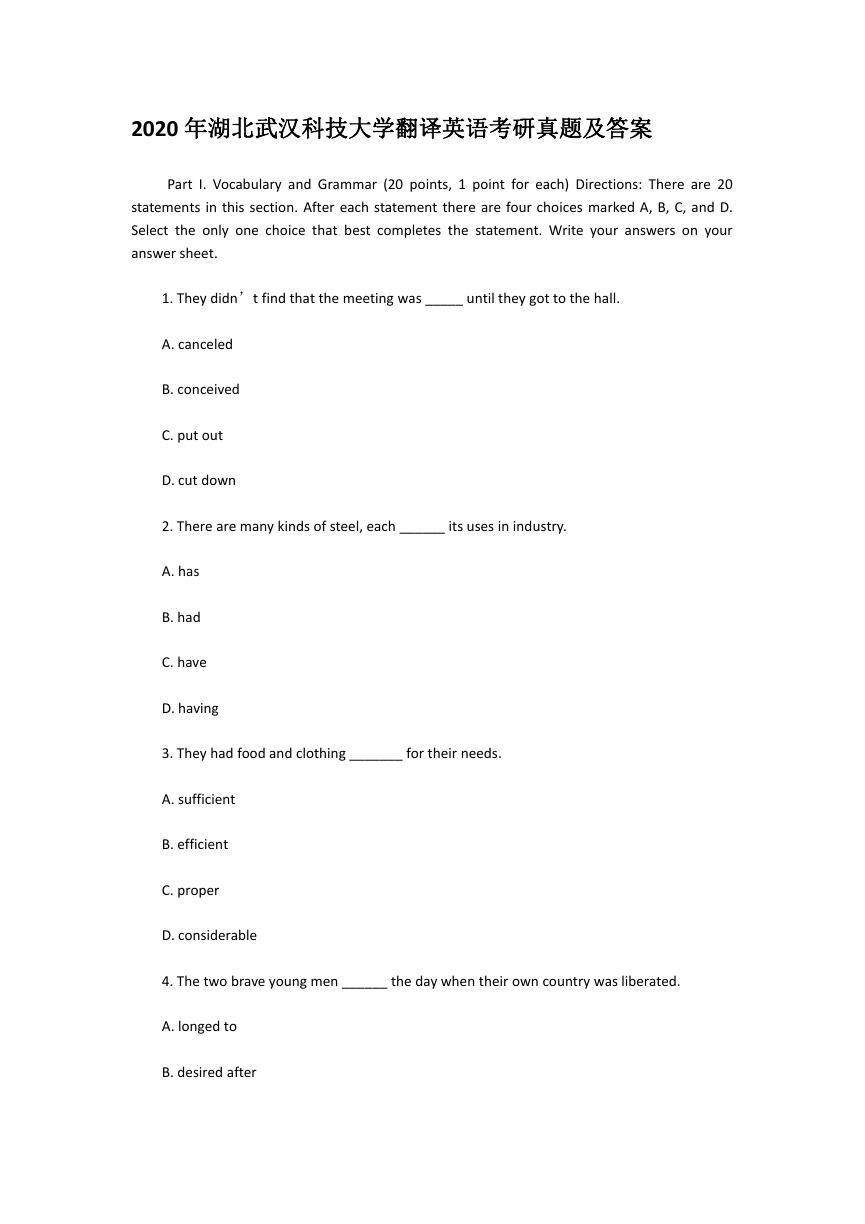
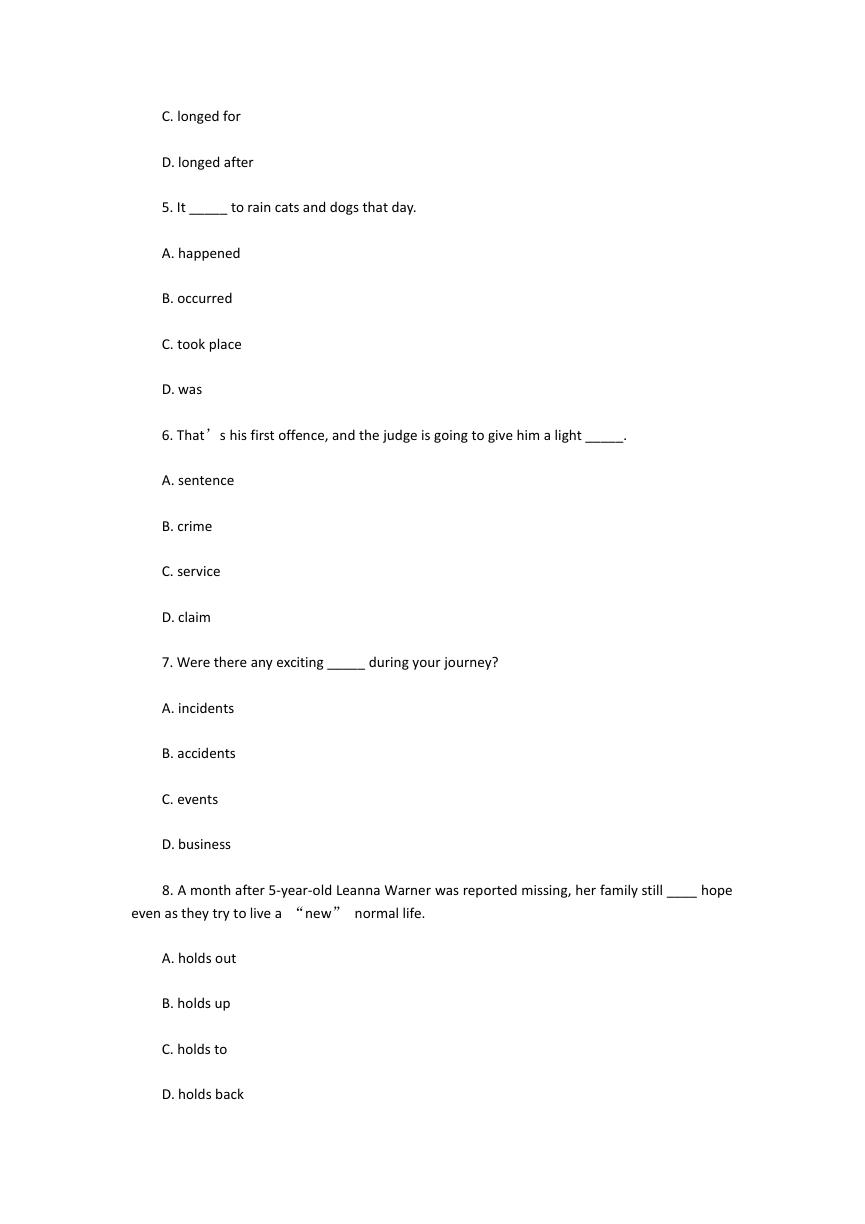
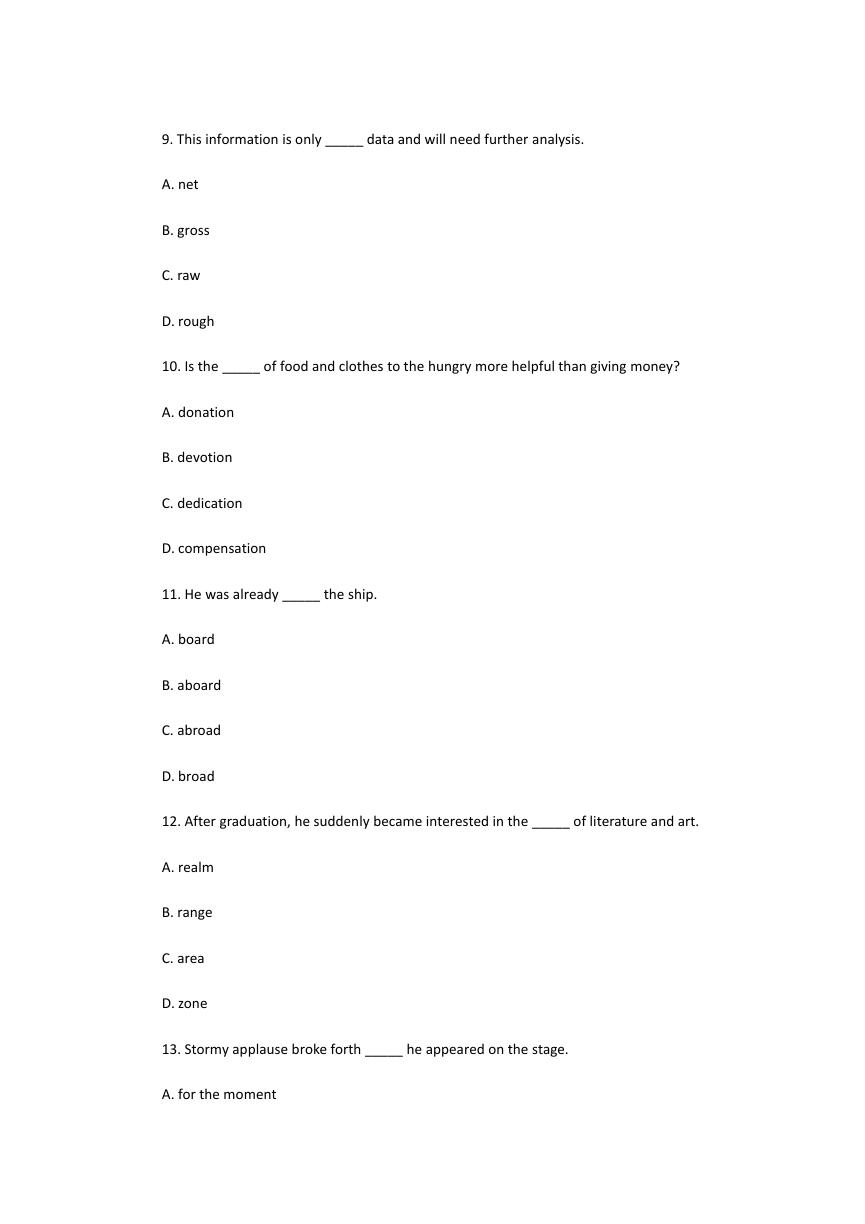
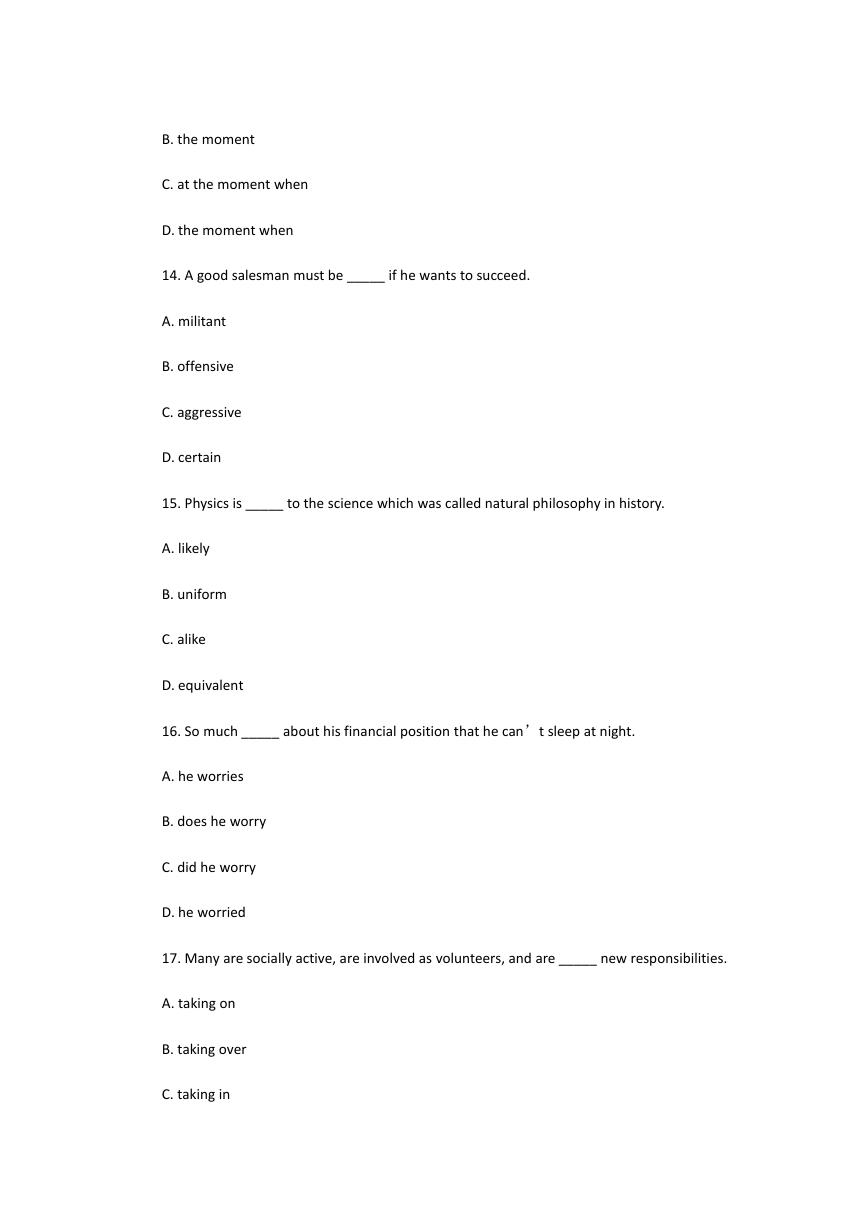
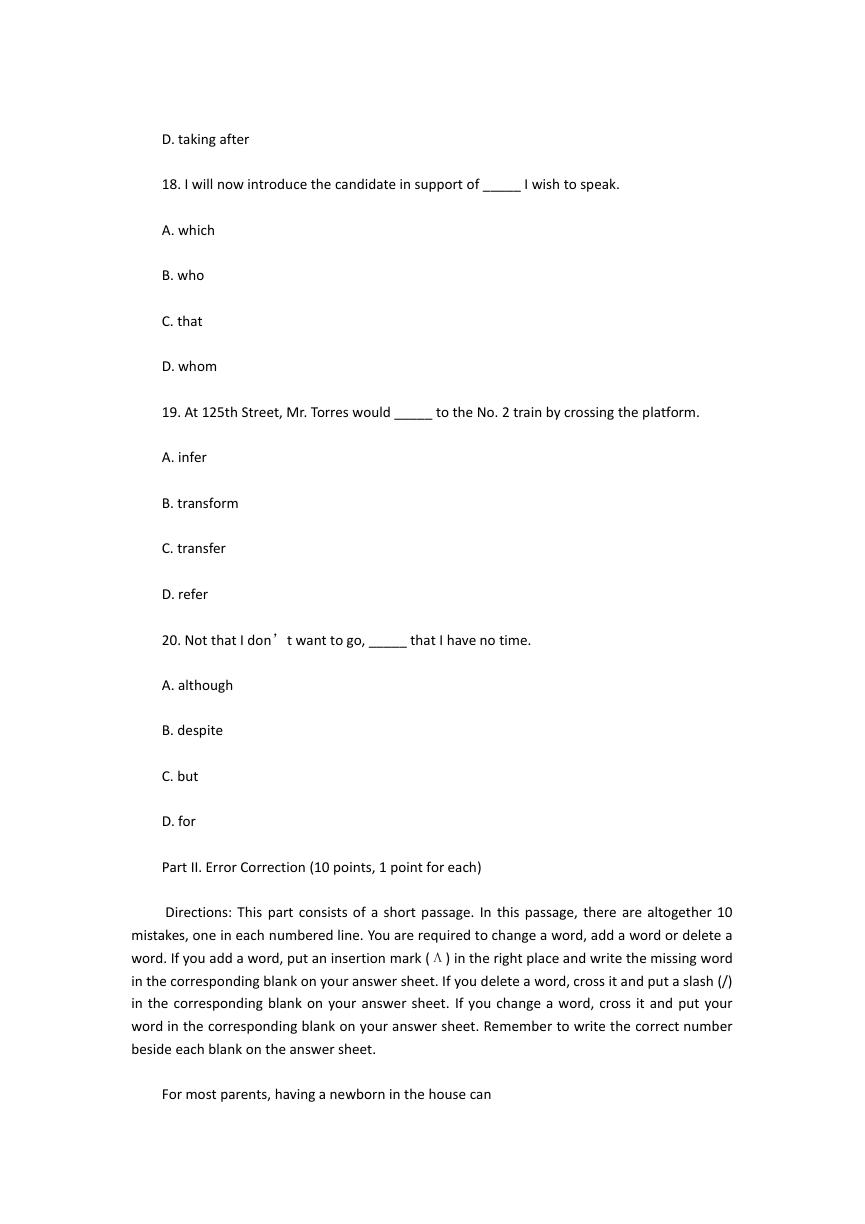
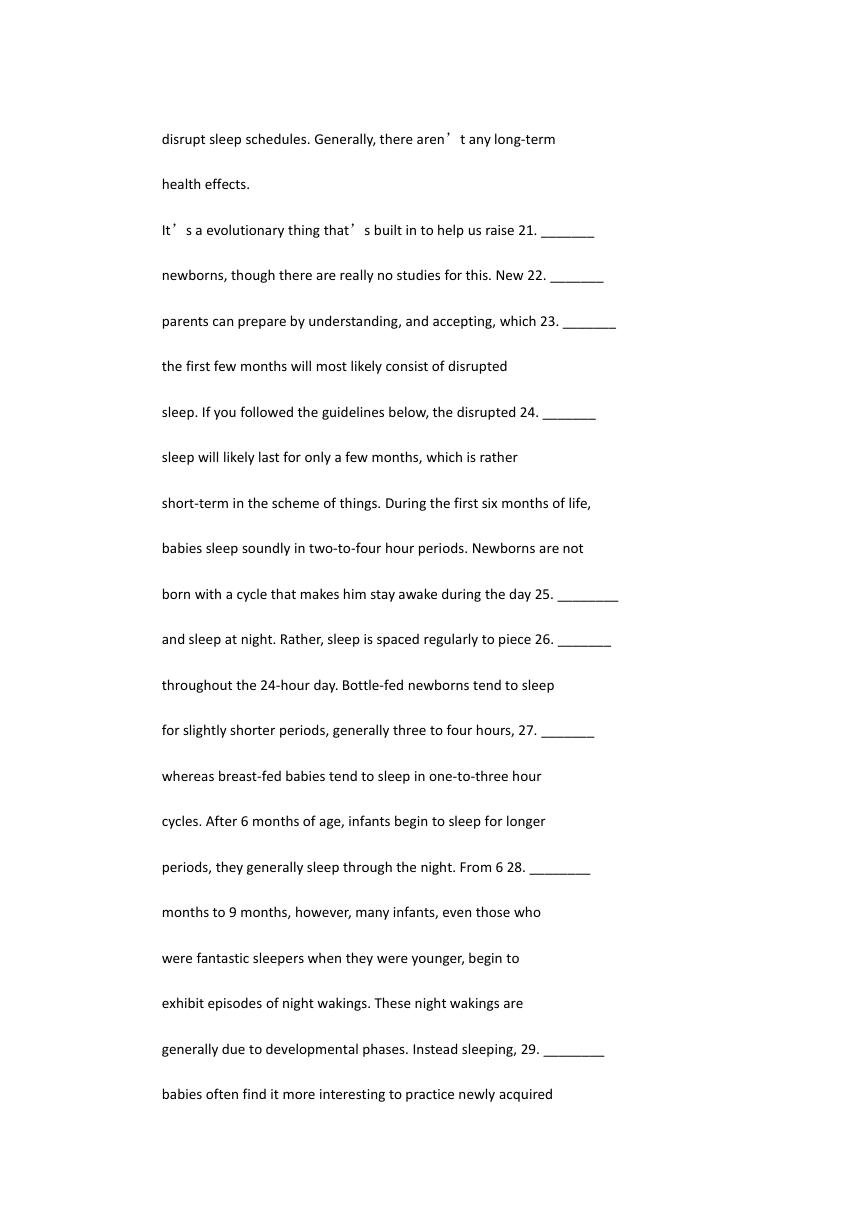
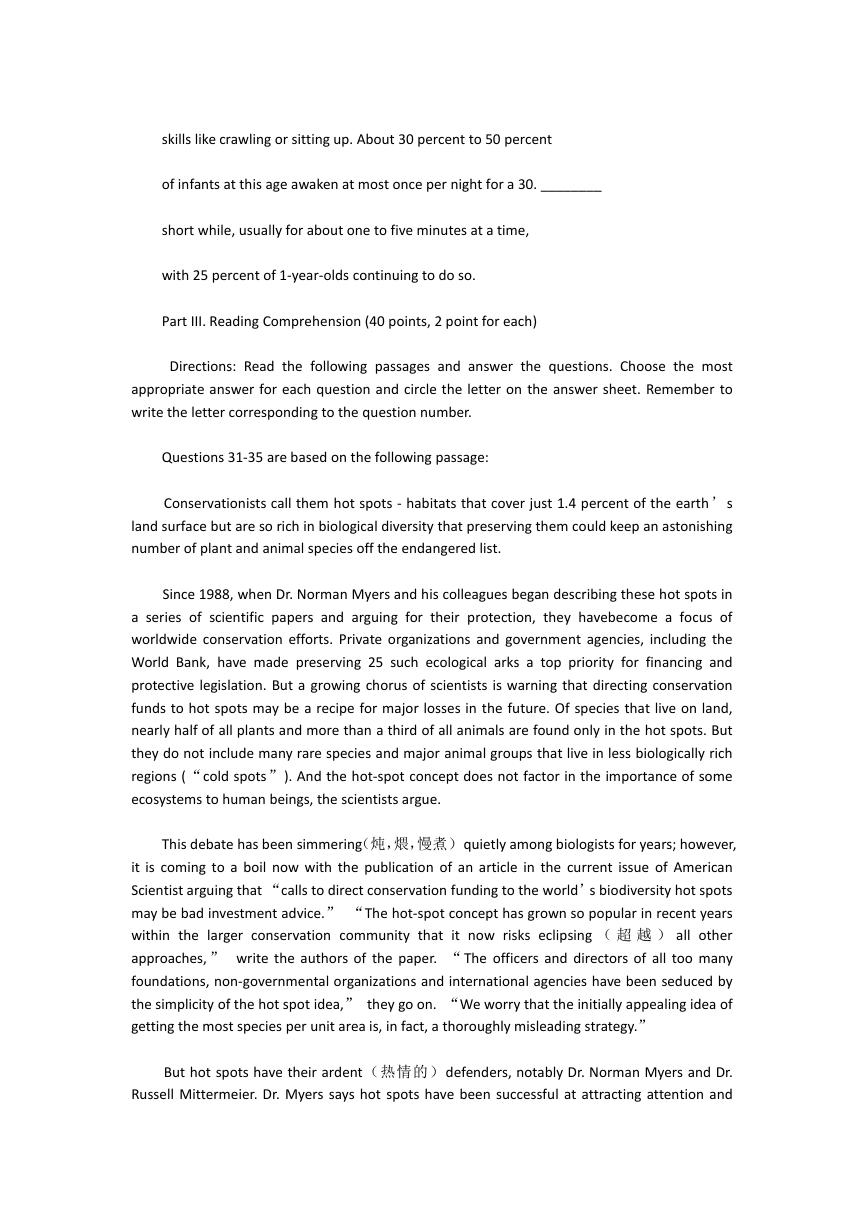
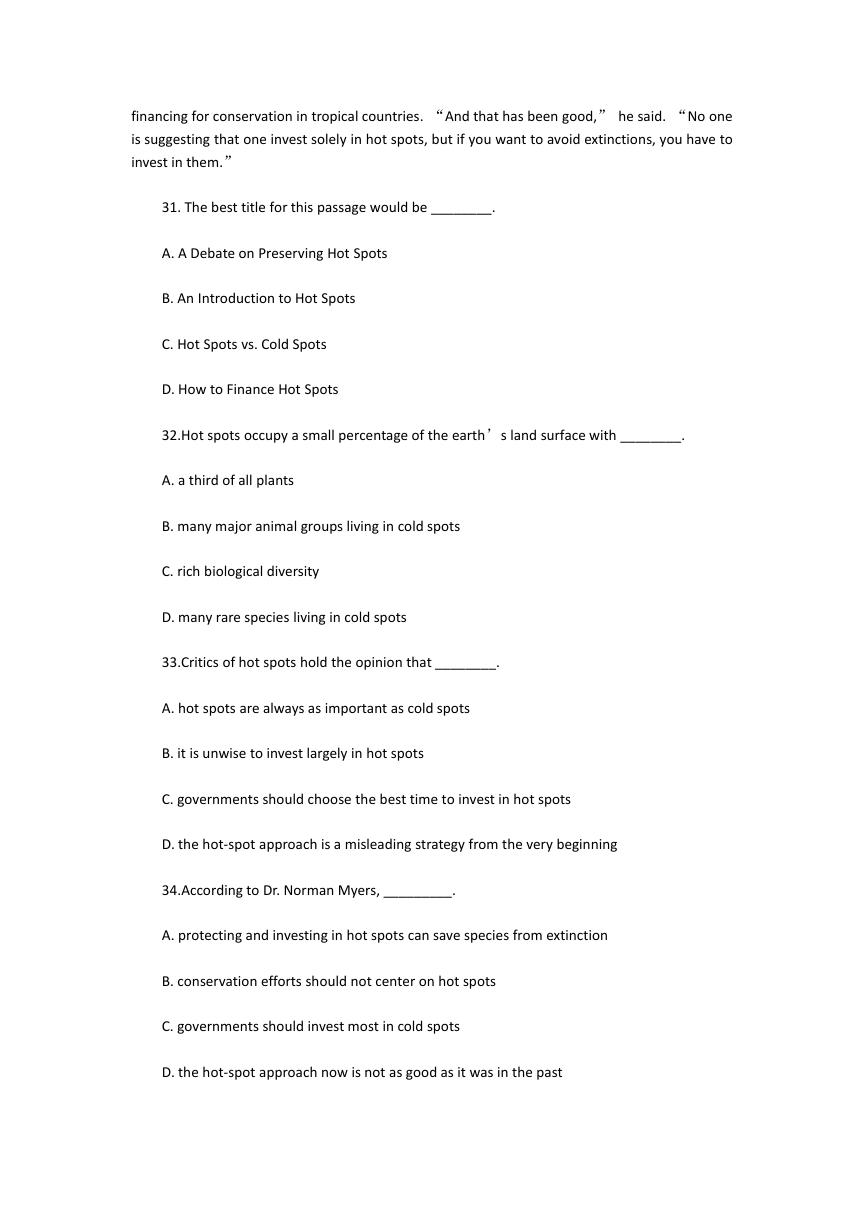








 2023年江西萍乡中考道德与法治真题及答案.doc
2023年江西萍乡中考道德与法治真题及答案.doc 2012年重庆南川中考生物真题及答案.doc
2012年重庆南川中考生物真题及答案.doc 2013年江西师范大学地理学综合及文艺理论基础考研真题.doc
2013年江西师范大学地理学综合及文艺理论基础考研真题.doc 2020年四川甘孜小升初语文真题及答案I卷.doc
2020年四川甘孜小升初语文真题及答案I卷.doc 2020年注册岩土工程师专业基础考试真题及答案.doc
2020年注册岩土工程师专业基础考试真题及答案.doc 2023-2024学年福建省厦门市九年级上学期数学月考试题及答案.doc
2023-2024学年福建省厦门市九年级上学期数学月考试题及答案.doc 2021-2022学年辽宁省沈阳市大东区九年级上学期语文期末试题及答案.doc
2021-2022学年辽宁省沈阳市大东区九年级上学期语文期末试题及答案.doc 2022-2023学年北京东城区初三第一学期物理期末试卷及答案.doc
2022-2023学年北京东城区初三第一学期物理期末试卷及答案.doc 2018上半年江西教师资格初中地理学科知识与教学能力真题及答案.doc
2018上半年江西教师资格初中地理学科知识与教学能力真题及答案.doc 2012年河北国家公务员申论考试真题及答案-省级.doc
2012年河北国家公务员申论考试真题及答案-省级.doc 2020-2021学年江苏省扬州市江都区邵樊片九年级上学期数学第一次质量检测试题及答案.doc
2020-2021学年江苏省扬州市江都区邵樊片九年级上学期数学第一次质量检测试题及答案.doc 2022下半年黑龙江教师资格证中学综合素质真题及答案.doc
2022下半年黑龙江教师资格证中学综合素质真题及答案.doc